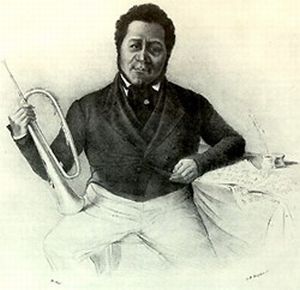Early years
Francis B. Johnson was born in 1792 on the island of Martinique in the West Indies. Francis received training from an Irish-keyed bugle soloist by the name of Richard Willis. At the age of 17, Johnson had immigrated to Philadelphia, Pennsylvania. By that time, he was already proficient in the keyed bugle and the violin. A few years later, he was building a reputation as a bandleader in Philadelphia and southeastern Pennsylvania.
Publishing
In 1817, music publisher, George Willig, published Francis' Collection of New Cotillions. Francis B. Johnson became the first black composer to have his compositions published. By 1818, Johnson had become a leading dance band conductor in Philadelphia.
Francis' Dance Bands
In 1837, Johnson decided that he and his band were planning to travel overseas to Europe. This was the first time that African American musicians toured Europe. They also had the pleasure of playing at the Buckingham Palace, and one of their audience members was Victoria right around the time that she was crowned Queen of England. In 1838, they returned around Christmas. Johnson’s band toured throughout the U.S. including Detroit, Ann Arbor, Louisville, and Cleveland, as well as parts of Canada. Despite their success, they were still not allowed to perform in certain states, like Missouri.
Racial Injustice
Francis would conduct pieces by Haydn and Handel at local black churches. He showed racial pride when he composed the “Recognition March on the Independence of Haiti” and “The Grave of the Slave”. At times, all-white bands would refuse to perform in parades if Johnson’s band was going to be there. One time in Pittsburgh, there was an incident with an angry mob throwing rocks at Francis' band while yelling racial slurs.
Francis' Compositions
Throughout his career, Johnson composed over 200 arrangements including cotillions, operatic airs, ballads, quadrilles, patriotic marches, quicksteps, and other forms of ballroom music.
Death and Legacy
In Johnson’s later years, he would still compose but was retired from performing. Johnson died in 1844, and his funeral was attended by hundreds of African Americans from the community. Francis' band renamed themselves the Frank Johnson String and Brass Band. The band ended during the American Civil War. There are some musicologists that believe Francis B. Johnson was the forefather of ragtime and jazz.
